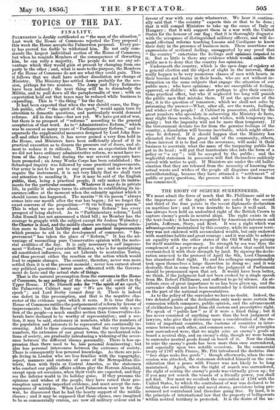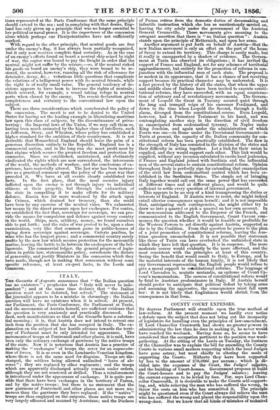THE RIGHT OF SEIZURE SURRENDERED.
WE must admit the force of much that Mr. Phillimore said as to the importance of the rights which are ceded by the second and third of the four points in the recent diplomatic declaration on maritime law ; and it was desirable to have it well said. It has always been held an undoubted right of the British Crown to capture enemy's goods in neutral ships. The right exists in all the text-books ; it has been recognized by American statesmen and jurists, Jefferson, Story, and • Kent. It was a right which was advantageously maintained by this country, while its narrow terri- tory was not endowed with accumulated wealth, but only endowed with maritime habits and great courage ; and it was able to achieve an equality with the other states of the Old World by gaining for itself maritime supremacy. Its strength by sea was thus the complement of a power as great as that of states that could have overmatched it with their strength by land. By signing the decla- ration annexed to the protocol of April the 8th, Lord Clarendon has abandoned that right. He and his colleague unquestionably took upon themselves a large discretion in doing so ; and it was desirable that in some form or other the judgment of Parliament should be pronounced upon that act. It would have been better, we think, if the judgment had not been evoked by a single speech from Mr. Robert Phillimore, and suffered to go by silence. An at- tribute once of great importance to us has been given up, and the surrender should not have been unattended by a distinct sanction on the part of the national representatives. As to the policy of the surrender we have no doubt. Indeed, the two debated points of the declaration only made more certain the concession which commerce, public opinion, and the advancement of civilization have gained from old custom and prescriptive right. We speak of " public law " as if it were a fixed thing ; but it has never consisted of anything more than the best judgment of lawyers, who give their decisions upon a consideration of the sta- tutes of important countries, the customs of countries in inter- course between each other, and common sense. Our old principles now surrendered were, that we might seize an enemy's goods on board a neutral ship, and an enemy's ship, though we were bound to surrender neutral goods found on board of it. Now the claim to seize the enemy's goods has been more than once surrendered, and especially upon two notable occasions. In the commercial treaty of 1787 with France, Mr. Pitt introduced the doctrine that " free ships make free goods " ; though afterwards, when the con- cession was attacked, the statesman defended'himself on the con- sideration that a .peace with France was not likely to be long, maintained. Again, when the right of search was surrendered, the right of seizing the enemy's goods was virtually given up ; for if you may not search the vessels of a friendly power, you shall not find. Nor must we overlook the convention of 1794 with the United States, by which the contraband of war was declared to be nothing else save military and naval stores, provisions being pro- nounced not contraband and therefore going free. By land, it is the principle of international law that the property of belligerents
i within neutral territory is protected. It is the desire of the na-
tions represented at the Paris Conference that the same principle should extend to the sea ; and in complying with that desire, Eng- land has only given up a principle that was no longer essential to her political or naval power. It is the importance of the concession alone which perhaps oar Plenipotentiaries have not sufficiently marked.
With regard to the other principle, that neutral goods are free under the enemy's flag, it has always been
partiallisrecorized,
but it only now receives complete final certainty. in the case of an enemy's effects found on board a neutral ship seized by right of war, the captor was bound to pay the freight in order that the neutral might not suffer by the seizure,—so, if the neutral risked his goods on board an enemy's ship, they were bound to be re- stored, the neutral, however, running all the risk of allowance for detainder, decay, &c. ; veljatious little questions that complicate the relations of a belligerent power with its neutral friends, while the right is of really small value. The general tendency of de- cisions appears to have been to increase the rights of neutrals ; which covered, for example, a vessel taking refuge in neutral ports when chased by the enemy. The recent declaration gives completeness and certainty to the conventional law upon the subj ect.
There are three considerations which corroborated the policy of the concession. The merit is not to be denied to the United States for having set the leading example in liberalizing maritime law upon this class of subjects, by the discontinuance of priva- teering ; the Imperial laws of the Union, if we may call them-so, having been much animated by the higher class of intellects, such as Jefferson, Story, and Wheaton, whose policy has established a higher standard for the ambition of their countrymen. It is not desirable that Monarchical England should leave the palm of a generous discretion entirely to the Republic. England too is a commercial nation, and in the long run she must profit most by that regime which secures the greatest freedom and protection for commerce. Since we established, maintained, and obstinately vindicated the rights which are now surrendered, the intercourse of the world, the methods of warfare, and the conclusions of ex- perience, have materially altered. The last -War has been instruc- tive as a practical comment upon the policy of the great war that preceded it. We have at all events clearly established two facts. In the first place, that the most Coercive injury inflicted upon the enemy is not through injury • to individual citizens or their property, but through the exhaustion of the state in compelling it to make efforts for its military defence. Russia was far more weakened by the attack upon the Crimea, which drained her treasury, than she could have been by any exercise of the neutral rules. We exhausted her means by the direct pressure upon her exchequer. Per contra, we established the fact that, sovereign for sovereign, we can pro- vide the means for compulsion and defence against every country in the world. Ships, men, artillery, money, we found ourselves able to put forth ; and the rules of war proved to be, upon a close examination, very like that common game in public-houses of laying down sovereign against sovereign. Cesteris paribus, he wins who has the longest purse ; and a commercial country surely profits by the new law which secures protection for the mercantile marine, leaving the battle to lie between the exchequers of the bel- ligerents. The commercial ledger, the general progress of legis- lation in public law, statesmanlike policy, corroborate the dictate of generosity, and justify Ministers in the concession which they have made, though not in making that concession without some specific reference, at least ex-post facto, to the Lords and Commons.



























 Previous page
Previous page